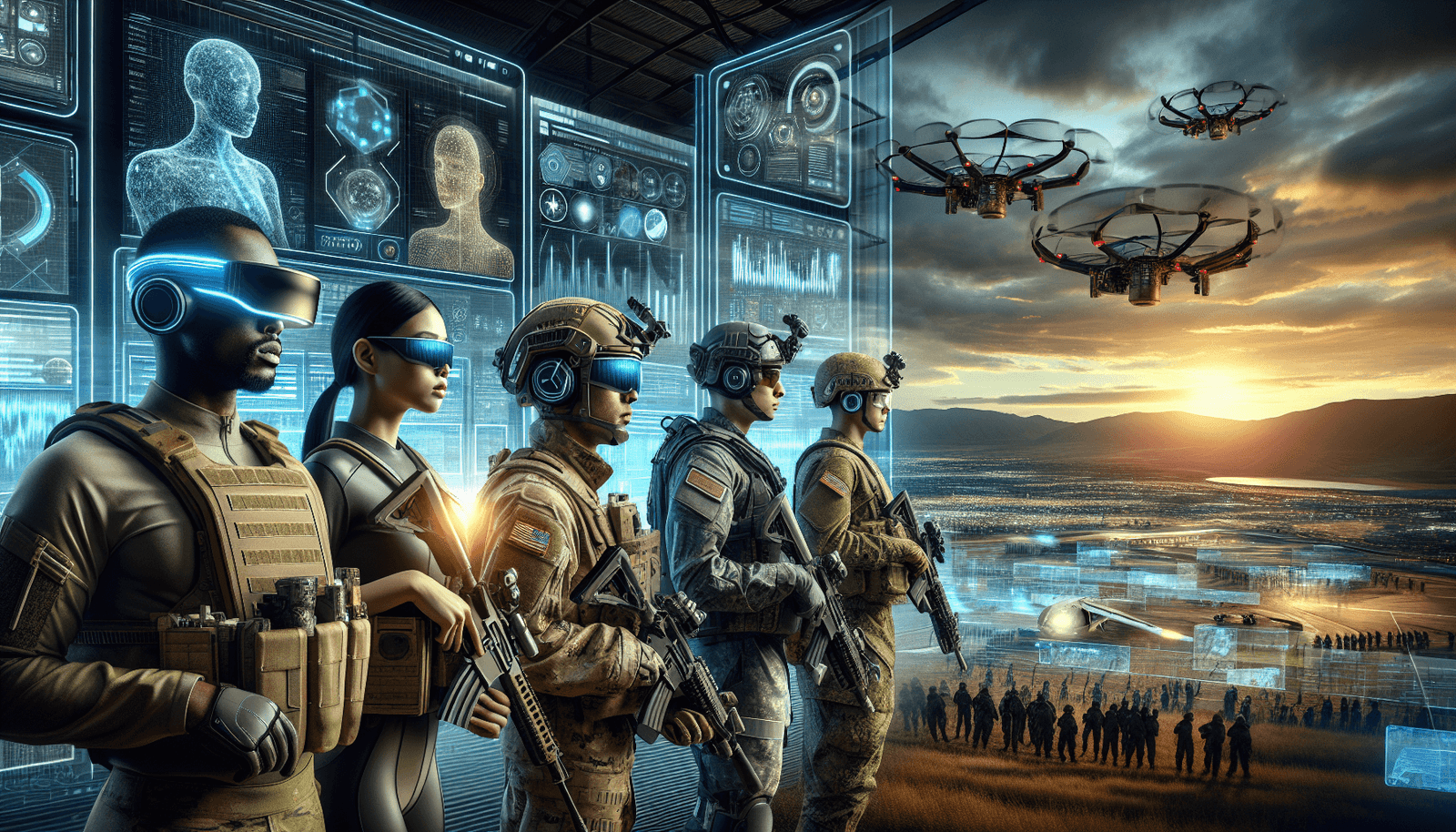In recent years, artificial intelligence (AI) has emerged as a transformative force across various industries, and the defense sector is no exception. As military operations become increasingly complex, the integration of AI offers unprecedented opportunities for enhancing operational efficiency and decision-making. In this exploration of the future of defense, we will delve into the ways AI is shaping the landscape of national security, from autonomous systems and battlefield analytics to cybersecurity advancements and strategic planning. The implications for both military and civilian sectors are profound, signaling a new era in how nations prepare for and respond to threats.
The Role of AI in Defense: Why Palantir Excels
The conversation surrounding national security has taken a dynamic twist with the rise of artificial intelligence (AI). Especially in recent months, the buzz is palpable as companies like Palantir have taken significant strides in harnessing AI to redefine the contours of defense strategies. Founded in 2003, Palantir Technologies has become synonymous with big data. Their advanced AI platforms, such as Foundry and Gotham, are revolutionizing how military agencies analyze data, make decisions, and ultimately, keep nations safe.
Understanding AI in the Defense Landscape
AI’s role in defense goes beyond simple automation; it enables richer data interpretations and predictive analytics that aid military leaders in crisis situations. From predictive maintenance of equipment to real-time surveillance analysis, AI can dramatically reduce response times and enhance the effectiveness of existing military frameworks.
For instance, military leaders once relied heavily on human operators to sift through mountains of data, extract actionable insights, and make critical decisions. Now, advanced machine learning algorithms can sift through that very same data at lightning speed, spotting trends and making recommendations based on scenarios that humans may not have considered. This significant advancement amplifies the effectiveness of military strategy and operational readiness.
The Power of Palantir’s Innovative Solutions
Why does Palantir excel in this high-tech defense arena? The answer lies in its innovative approach to data integration and analysis. Their platforms unite disparate data sources—ranging from sensor data to human intelligence—into a cohesive operational picture. This interconnected network allows defense organizations to visualize complex challenges and devise more informed strategies.
Palantir’s software tools are particularly praised for their ability to conduct “what-if” analysis, allowing military leaders to simulate various scenarios before unfolding them in real-time. The immediacy of insights derived from Palantir’s AI models empowers commanders to strategize effectively, optimize resource allocation, and enhance mission success rates.
Applications of AI in Defense
Here are some notable applications of AI technology within the defense landscape:
- Autonomous Systems: Drones and unmanned vehicles powered by AI technology can conduct surveillance, deliver supplies, and even engage in combat without direct human intervention. This reduces risk to personnel and allows for more strategic deployment of resources.
- Cybersecurity: AI algorithms analyze network traffic to detect anomalies indicative of cyber-attacks, substantiating efforts to protect critical infrastructure from evolving threats.
- Logistics Optimization: AI-driven processes enhance supply chain management, ensuring that troops have the resources they need at the right time and place.
- Training and Simulation: Advanced AI systems create realistic training scenarios for soldiers, improving their readiness for real-world missions through better preparation and adaptable learning environments.
With capabilities ranging from predictive maintenance to enhanced decision-making, it’s no surprise that defense agencies are increasingly turning to AI solutions like Palantir for their operational needs. In many ways, Palantir is setting the standard for AI applications in defense, providing powerful tools that can withstand both audits and the scrutiny of modern warfare.
The Competitive Edge: Operational Efficiency and Cost Savings
Adopting AI technologies provides a competitive edge to military forces around the globe. According to recent reports, integrating AI can lead to substantial cost savings and enhanced operational efficiency. By streamlining processes that would traditionally require extensive manpower, such as data analysis and supply chain logistics, departments can reallocate human resources to keep vital functions running seamlessly.
This approach isn’t merely about saving dollars; it’s about ensuring preparedness in an era where rapid responses are crucial. As discussed in a report by the Brookings Institution, military modernization hinges upon the successful integration of new technologies, making companies like Palantir valuable partners in this transformation. Simply put, the investment in AI isn’t just strategic; it’s an investment in national security.
Strategic Planning through AI Analytics
Palantir’s data analytics capabilities are particularly noteworthy in the context of strategic military planning. The platform is designed to harness vast amounts of data, enabling analysts and commanders to conduct comprehensive evaluations of scenarios that help inform military decisions. This aspect of AI applies to various operational environments, whether in conventional warfare or counterinsurgency operations.
Neyrotex.com highlights that with decision-making at the core of military operations, AI serves as a powerful ally that reduces ambiguity and fosters clarity. When faced with fast-evolving combat situations, recommendations generated by AI can help mitigate risks, ultimately allowing for actions that align with long-term strategic objectives.
The Ethical Dimension of AI in Warfare
As might be expected, the rapid rise of AI also raises ethical questions. Who is responsible when AI makes decisions that lead to unwanted outcomes? How do we safeguard against potential misuse of AI technologies in warfare? These questions are significant and demand robust discussion among military leaders, policymakers, and technologists alike.
Transparency in AI applications is essential for maintaining ethical standards. Companies like Palantir emphasize accountability and responsible usage of AI technologies, prioritizing human oversight in decision-making processes. The challenge moving forward will be ensuring that AI remains a tool for enhancing human accountability rather than replacing it.
Enhancing Collaboration in Multi-Domain Operations
Military forces are increasingly operating in multi-domain environments that necessitate seamless collaboration among land, air, sea, cyber, and space operations. AI stands as a unifying technology that can facilitate these complex interactions. Palantir’s systems are at the forefront of integrating inputs from various domains, enhancing situational awareness, and enabling more cohesive joint operations.
With a focus on communication and data sharing, Palantir strengthens alliances, serving as a goto resource for coalition forces striving to coordinate efforts in an increasingly dangerous landscape. This cohesive operational approach maximizes the effectiveness of defense strategies, transforming conventional military operations into adaptive, intelligence-led efforts.
The Future: A Technologically Advanced Defense Ecosystem
As we peer into the future of defense, it is evident that AI will be integral to fostering a technologically advanced defense ecosystem where data drives actions and informed decisions enhance outcomes. The need for agility in defense strategies is paramount, making AI and data analytics indispensable partners in modern warfare. In this new age of defense:
- Expect continual advancements in AI technologies that will define future military capabilities.
- The relationship between man and machine will evolve into a synergistic partnership focused on enhancing human decision-making without losing the critical role of human commanders.
- Defense agencies will prioritize ethical considerations, balancing technological advancement with responsible usage.
Conclusion: Embracing the AI Revolution in Defense
As threats to national security evolve, so too must the strategies to combat them. The defense sector is entering an era dominated by artificial intelligence, where companies like Palantir are paving the way through innovative solutions that enhance operational efficiencies and strategic planning. While challenges remain, the potential benefits of integrating AI into defense are profound, offering the opportunity for a more secure future for nations worldwide.
To learn more about how AI is transforming the defense sector, visit Neyrotex.com for insights and in-depth analyses. In this compelling journey through the landscape of defense technology, the convergence of AI and military strategy promises to redefine how countries ensure their sovereignty and security in an ever-changing world.
As we embrace the AI revolution in defense, let us remain vigilant stewards of our technologies, ensuring that they serve to protect and advance our humanitarian values, paving the way for a better tomorrow.
For additional insights into the intertwining of AI and defense, check out the Revolutionary Impact of AI on National Security or explore the Future of Warfare with AI Technologies.







